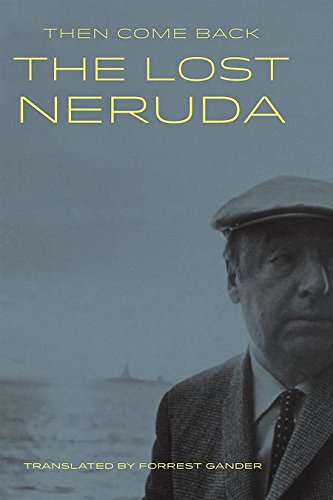About this item
Featured on NPR's "All Things Considered.""A literary event of universal importance." - The Guardian"The earliest poem in the collection dates to 1956, and several are love poems, a form Neruda was famous for." - The New York Times"This new volume will be a labor of love for the publisher and a joy for readers everywhere." - Library Journal"This brief visit with Neruda ends all too soon, yet reminds one why his work still matters." - The Washington PostPablo Neruda's lost poems - recently discovered in his archive to the delight of readers and scholars - comprise this remarkable and essential volume.Originally composed on napkins, playbills, receipts, and notebooks, Neruda's lost poems are full of eros and heartache, complex wordplay and deep wonder. Presented with the Spanish text, full-color reproductions of handwritten poems, and dynamic English translations, Then Come Back: The Lost Neruda simultaneously completes and advances the oeuvre of the world's most beloved poet.Crossing the sky I nearthe red ray of your hair.Of earth and wheat I am and as I close-inyour fire kindles itselfinside me and the rocksand flour ignite.That's why my heartexpands and risesinto bread for your mouth to devour,and my blood is wine poured for you.You and I are the land with its fruit.Bread, fire, blood and winemake up the earthly love that sears us. Pablo Neruda (1904-1973) is one of the world's most beloved and best-selling poets. He received the Nobel Prize for Literature in 1971.Translator Forrest Gander teaches at Brown University and was a finalist for the Pulitzer Prize.
About the Author
Pablo Neruda
Pablo Neruda was the pen name and, later, legal name of the Chilean writer and politician Neftalí Ricardo Reyes Basoalto. Neruda assumed his pen name as a teenager, partly because it was in vogue, partly to hide his poetry from his father, a rigid man who wanted his son to have a "practical" occupation. Neruda's pen name was derived from Czech writer and poet Jan Neruda; Pablo is thought to be from Paul Verlaine. With his works translated into many languages, Pablo Neruda is considered one of the greatest and most influential poets of the 20th century. Neruda was accomplished in a variety of styles, ranging from erotically charged love poems like his collection Twenty Poems of Love and a Song of Despair, surrealist poems, historical epics, and overtly political manifestos. In 1971 Neruda won the Nobel Prize for Literature, a controversial award because of his political activism. Colombian novelist Gabriel García Márquez once called him "the greatest poet of the 20th century in any language. "On July 15, 1945, at Pacaembu Stadium in São Paulo, Brazil, he read to 100,000 people in honor of Communist revolutionary leader Luís Carlos Prestes. When Neruda returned to Chile after his Nobel Prize acceptance speech, Salvador Allende invited him to read at the Estadio Nacional before 70,000 people. During his lifetime, Neruda occupied many diplomatic posts and served a stint as a senator for the Chilean Communist Party. When Conservative Chilean President González Videla outlawed communism in Chile, a warrant was issued for Neruda's arrest. Friends hid him for months in a house basement in the Chilean port of Valparaíso. Later, Neruda escaped into exile through a mountain pass near Maihue Lake into Argentina. Years later, Neruda was a close collaborator to socialist President Salvador Allende. Neruda was hospitalized with cancer at the time of the Chilean coup d'état led by Augusto Pinochet. Three days after being hospitalized, Neruda died of heart failure. Already a legend in life, Neruda's death reverberated around the world. Pinochet had denied permission to transform Neruda's funeral into a public event. However, thousands of grieving Chileans disobeyed the curfew and crowded the streets to pay their respects. Neruda's funeral became the first public protest against the Chilean military dictatorship.
More about
Pablo Neruda »
Report incorrect product information.


